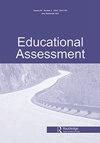学习计划对大学生评价观念影响的调查研究
IF 2.3
Q1 EDUCATION & EDUCATIONAL RESEARCH
引用次数: 0
摘要
本研究的重点是课程变量对学生与评估相关的目的和效果、所使用的评估方法和评估的感知使用的影响。通过对参加不同课程的学生进行调查(n = 4144)和焦点小组(n = 250),在五所葡萄牙公立大学收集了数据。调查结果指出,在评估目的、最常用的评估方法和对评估使用的感知方面,统计上存在显著差异。主要的差异在于不同课程所使用的方法种类:法律课程报告使用集体评估方法和组合的频率最低,而心理学、机械和工业工程课程报告使用个别方法的频率最低。教育科学报告使用各种方法的频率更高,而且报告比其他方案更倾向于使用替代方法。负面情绪与护理专业学生的评估最相关,教育科学专业的学生比其他专业的学生更多地参与评估过程。讨论了研究结果的含义。本文章由计算机程序翻译,如有差异,请以英文原文为准。
Investigating the Effect of the Programme of Study on University Students’ Perceptions about Assessment
ABSTRACT This study focuses on the effect of the programme variable on the purposes and effects that students associate with assessment, on the assessment methods used and on the perceived use of assessment. Data were collected in five Portuguese Public Universities through a survey (n = 4144) and focus group (n = 250) with students enrolled in different programmes. Findings point to statistically significant differences in relation to the purpose of assessment, assessment methods most used and perceived use of assessment. The main differences were found in the kinds of methods used in different programmes: Law reported the lowest frequency of the use of collective assessment methods and portfolios, whereas Psychology, Mechanical and Industrial Engineering were the programmes that reported the lowest frequency of use of individual methods. Educational sciences reported more frequency of all types of methods and reported significantly more preference for the use of alternative methods than the remaining programmes. Negative emotions were most associated with assessment by Nursing students and Educational Sciences’ students reported more participation in the assessment process than students from all other programmes. Implications of the findings are discussed.
求助全文
通过发布文献求助,成功后即可免费获取论文全文。
去求助
来源期刊

Educational Assessment
EDUCATION & EDUCATIONAL RESEARCH-
CiteScore
3.20
自引率
6.70%
发文量
24
期刊介绍:
Educational Assessment publishes original research and scholarship on the assessment of individuals, groups, and programs in educational settings. It includes theory, methodological approaches and empirical research in the appraisal of the learning and achievement of students and teachers, young children and adults, and novices and experts. The journal reports on current large-scale testing practices, discusses alternative approaches, presents scholarship on classroom assessment practices and includes assessment topics debated at the national level. It welcomes both conceptual and empirical pieces and encourages articles that provide a strong bridge between theory and/or empirical research and the implications for educational policy and/or practice.
 求助内容:
求助内容: 应助结果提醒方式:
应助结果提醒方式:


